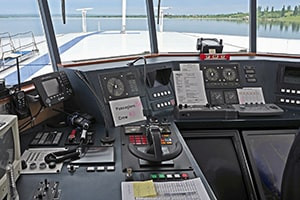El campo de la ingeniería marítima ha evolucionado continuamente, mejorando la eficiencia y la eficacia de las operaciones, algunas de las cuales se han dirigido a la electrónica marina. Hemos creado diferentes aplicaciones para diversos componentes electrónicos, como baterías, celdas y resistencias. Las resistencias, por ejemplo, desempeñan un papel crucial en el control del flujo de corriente eléctrica en prácticamente todos los circuitos electrónicos marinos que se encuentran a bordo de barcos y embarcaciones. Este curso busca revelar el funcionamiento de la resistencia y las baterías que se utilizan en la electrónica marina, cuyas aplicaciones se pueden ver en diferentes circuitos a bordo de los barcos. Estas pueden ser esenciales para el funcionamiento de barcos y embarcaciones. Descubra los aspectos técnicos y otras funcionalidades de las resistencias no lineales, incluidos los termistores y los varistores. En este curso también se presentan ilustraciones que explican los gráficos de voltaje-corriente de estas resistencias no lineales para ayudarlo a comprender mejor los componentes electrónicos marinos
importantes.
Este curso ofrece una comprensión del funcionamiento, los principios y las aplicaciones de la resistencia eléctrica en los circuitos. Cubriremos los conocimientos básicos sobre el uso, las aplicaciones y las propiedades de las baterías relevantes para la electrónica marina e introduciremos los materiales, la resistencia y la resistividad relacionados con los tipos de resistencias. Se discuten la electrólisis, las celdas de plomo-ácido, los tipos de baterías y las aplicaciones de las baterías. Este curso ofrece valiosas lecciones sobre aspectos de las baterías relevantes para la electrónica marina, incluidas las eficiencias y clasificaciones de las baterías, la resistencia interna y la polaridad, así como el rendimiento y el mantenimiento de las baterías. Le recomendamos que identifique las resistencias lineales y distinga otras resistencias de ellas. También se explican detalladamente las diferentes técnicas e instrumentos para medir la resistencia eléctrica.
Por último, nuestro objetivo es proporcionarle una visión de la electrónica, que consiste en conceptos básicos de tecnología electrónica para hacer frente a los elementos más avanzados de las baterías que utilizan los marineros y las personas relacionadas con la tecnología marítima. Proponemos varios materiales, la resistencia y la resistividad, estudiando los principios fundamentales del funcionamiento de las resistencias. El curso introducirá más a fondo las baterías y la electrólisis, observando cómo intervienen en la generación, el almacenamiento y la transmisión de energía. Los estudiantes, investigadores, ingenieros marinos y cualquier persona que desee aprender sobre la electrónica marina y sus diferentes funcionamientos encontrarán que este curso es invaluable. Nuestras vidas dependen cada vez más del movimiento de productos básicos desde nuestros hogares a costas extranjeras. Ambos utilizan complicadas tecnologías de transporte marítimo respaldadas por la electrónica. Por esta importante razón, es esencial tener conocimientos prácticos sobre la resistencia eléctrica y las baterías. Por lo tanto, inscríbase hoy mismo en este curso y adquiera una gran experiencia en resistencia y baterías para la electrónica marina, su funcionamiento y aplicaciones en los sistemas marinos pertinentes
.
Conoce lo que aprenderás en este curso gratuito
Ver Todos los resultados de aprendizaje Ver menos Todos los cursos de Alison son gratuitos para inscribirse, estudiar y completar. Para completar con éxito este curso certificado y convertirte en un graduado de Alison, debes obtener un 80% o más en cada evaluación del curso.
Una vez que hayas completado este curso certificado, tienes la opción de adquirir un Certificado oficial, que es una excelente manera de compartir tu logro con el mundo.
Su certificado de Alison es:
- Ideal para compartir con posibles empleadores.
- Excelente para tu CV, perfiles profesionales en redes sociales y solicitudes de empleo.
- Una muestra de tu compromiso con seguir aprendiendo, desarrollar nuevas habilidades y obtener grandes resultados.
- Un incentivo para que sigas empoderándote a través del aprendizaje continuo.
Alison ofrece 2 tipos de certificado para los Cursos Certificados completados:
- Certificado Digital: un Certificado descargable en formato PDF, disponible inmediatamente para ti cuando completes tu compra.
- Certificado Físico: una versión física de tu Certificado oficialmente autenticado y con marcas de seguridad
Todos los Certificados están disponibles para su compra a través de la Tienda Alison. Para obtener más información sobre la compra de Certificados de Alison, visita nuestras Preguntas Frecuentes. Si decides no comprar tu Certificado de Alison, aún puedes demostrar tu logro con la opción de compartir tu Registro de Aprendizaje o Verificación de Logro de Aprendizaje, ambos accesibles desde tu Configuración de Cuenta.











 Horas promedio
Horas promedio  Contiene video
Contiene video  Acreditado por CPD
Acreditado por CPD 

 XP Total:
XP Total: 
 Conocimientos y habilidades que aprenderás
Conocimientos y habilidades que aprenderás 







